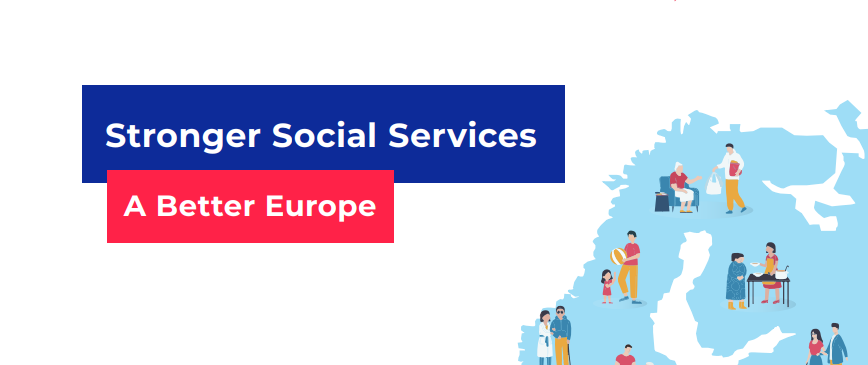The European Union (EU) and international frameworks like the United Nations Sustainable Development Goals (SDGs) provide a supporting role for national, regional and local social policy implementation through policy principles, recommendations and implementation tools like funding. At ESN, we connect policy-makers at European and international levels with policy-makers in local public social services. By doing this, we bring local knowledge to the development of European and international policy and inform social services of European initiatives for local implementation.
The European Semester is an annual economic and social policy coordination cycle between the European Commission and Member States. Launched in 2014, our Reference Group of leaders in social services carries out analysis and recommendations for the European Semester. Each year, we organise meetings between the Group and European Commission officials to raise awareness of the issues facing social services, so that these can be addressed in the European Commission’s policy guidance to national governments. Find out more about the outcomes of our annual meetings here.
In 2018 ESN launched a Working Group on the Sustainable Development Goals (SDGs) to help our members to understand how they contribute to the implementation of the SDGs through their local programmes, and to highlight to UN policy-makers the role played by public social services in regions and municipalities in the implementation of the SDGs. Each year we organise a meeting of our members and publish a report summarising the key messages from the perspective of public social services.
Resources:
A strong and well-resourced social services sector is fundamental to ensure the success of social inclusion policies. European funds, such as the European Structural and Investment Funds (ESIF) are a significant source of support for local social services programmes managed by public authorities. Therefore, we have provided advice and guidelines for social services to help access them.
We also channel the recommendations of our members who use EU funds to EU policy-makers to improve the design and management of EU funds. In April 2019 we organised a meeting in the European Parliament with our members and MEPs on how the 2021-2027 European Social Fund Plus (ESF+), can support quality social services. In February 2020, we organised a meeting in the European Parliament with our members and MEPs to discuss innovative ways to implement the European Fund for the Most Deprived.
Also in 2020, ESN created a working group to promote the inclusion of social priorities in EU funds designed to address the consequences of the pandemic, such as REACT-EU or the Recovery and Resilience Facility (RRF). Meetings involved members and EU officials to highlight challenges in accessing EU funding and thematic priorities and proposals to improve management of ESIF operational programmes.
Resources:
We provide feedback and input on EU initiatives to champion social inclusion priorities, social services and the populations they serve.
The Europe 2020 strategy was launched in 2010 with the aim to promote smart, sustainable and inclusive growth. In 2016, we submitted our proposals for its mid-term review.
The 2019 European elections were the opportunity for European citizens to vote in the Members of the European Parliament (MEPs). In our European Parliament Elections briefing, we made an analysis of how the different European political parties plan to support social services and our proposals for newly elected MEPs.
The European Pillar of Social Rights, proposed by the European Commission in 2016 and endorsed in 2017 by the Council of the European Union, sets out the rights for Europeans based on 20 principles. In 2020, the Commission launched a consultation on an action plan for the implementation of the Pillar. We submitted our response to the proposal for the Pillar in 2016 and a series of proposals for implementation to be included in the action plan in 2020.
Also in 2020 the Commission launched a consultation on a future European Child Guarantee, to which ESN submitted its proposal for a child care guarantee articulated through national child care plans focused on the most vulnerable children and funded through European and national funds.
- 2020 Towards a people’s Europe - European Social Network (ESN) response to the European Comission Consultation action plan of the European Pillar of Social Rights
- 2020 ESN Response to the Child Guarantee Consultation
- 2016 Towards a people’s Europe - European Social Network (ESN) response to the Consultation on the European Pillar of Social Rights
- 2014 Responses to Europe 2020 Consultation
- 2012 Personal and Household Services - ESN response to the Commission consultation
- 2011 European Innovation Partnership on active and healthy ageing - Consultation response
- 2010 Consultation response European Commission’s Communication on the Rights of the Child (2011-2014)










